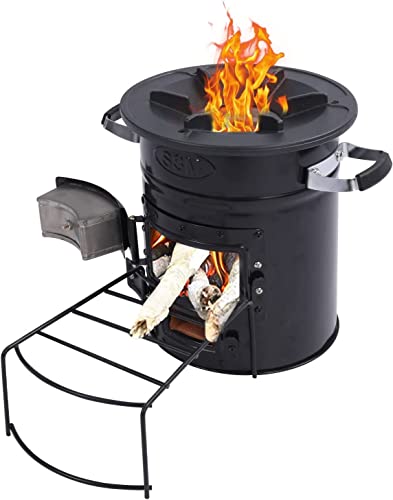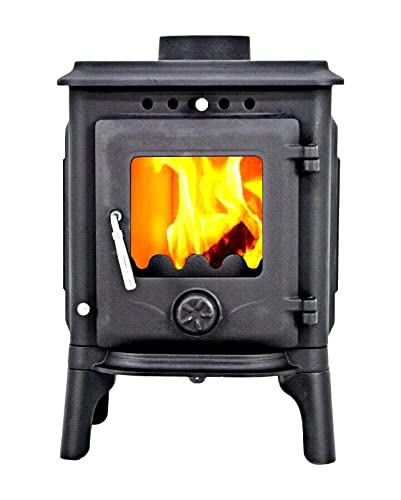10 Things You Learned In Kindergarden That Will Help You With Fireplac…
Page Information

Content
 Fireplaces Wood Burning Stoves
Fireplaces Wood Burning StovesWood stoves are stylish and contemporary, and they are a perfect match for a variety of home styles. They're a great source of heat that radiates warmth throughout the entire space.
Modern wood burner-burning stoves are EPA certified and feature high efficiency in heating and lower particle emissions. These efficiencies can be increased by operating the air controls correctly.
Energy Efficiency
Wood stoves are an excellent source of heat that can be used to supplement your heating system. Some models are just as efficient as furnaces and oil-burning appliances. Modern stoves are designed to maximize the amount of heat generated by each piece of wood. This means you don't have to purchase more wood, and you can have a warm fire all winter long.
Stoves that are certified by the EPA burn extremely cleanly and reduce emissions and waste by burning longer and using less fuel. This is in contrast to older fireplaces that rely on open flames and combustion that create waste of fuel, pollute air and cause dust to pollute your home.
The EPA certification of your wood stove assures that it complies with the highest standards for safety and efficiency. You can also get tax-free purchase of a stove with EPA certification. This can aid in saving money and lower your energy costs.
A outdoor wood fire stove stove will help you get rid of the major energy companies and any monopolies they may have in your area, freeing you from their erratic prices for gas and electricity. While you'll still have to pay for the wood coal stove for sale however, the price fluctuations will be less than those that you would face if you were to rely on a utility company.
Another benefit of heating your home using a wood stove is that it works well during power outages. If the power goes out during a snowstorm, you can keep your home warm by using a wood-burning stove to generate warmth for your kitchen and living areas. In some instances, the chimney on the stove can be used to release hot water through the wall to a hot-water tank in your home for more warmth.
If your wood-burning stove isn't insulated, it could be losing heat from the room and creating drafts within the home. This problem can be solved by installing an insulated liner for your wood-burning stove. This will not only help you save energy, but will also prolong the life of your stove by preventing heat from leaving the chimney.
Cleanliness
Wood stoves are a great way to save energy and keep warm, but they produce plenty of soot. It is crucial to keep your stove clean to keep your house safe and healthy. You should clean your stove at least once a week, and your chimney at least once per year. Keep your stove clean to ensure that it has the proper air flow. It also makes it safer to use.
The ash pan must be cleaned out. This is the first step to cleaning your stove. The ashes can be emptied into a dustpan, then placed in a non-combustible bin or bag. If your fireplace has andirons or grates, you can clean them using brushes and brooms and then dispose of the ashes in the same way. Afterward, wipe down the stove's front as well as any other surfaces you want to clean with a soft cloth. You can also use this occasion to clean your Ash tray or line it with fresh liners, which are readily available at your local hardware store.
After cleaning your stove, you'll need to clean any creosote left on the walls of your fireplace. This is best done with an broom that has a hard-bristled, beginning as high up as you can before moving downwards. If you own a vacuum cleaner that has an attachment that is hard-bristled, you can use this to remove loose soot as well.
It is also recommended to clear any obstructions to your chimney, should they be required. This could include twigs, branches, leaves, fruit, or even the nesting materials of small animals (which are often found nesting in chimneys and stove pipes!). Depending on where you live your chimney could be prone to the blowing of debris like leaves or sand.
It is also recommended that you have your chimney inspected every year at a minimum and to replace your catalytic filter every four to five years, as well as having the chimney cleaned by a professional if it is needed. These routine tasks can help prevent dangerous gases like carbon monoxide and fires from entering your home.
Convenience
A wood burning stove provides warmth and a cozy ambience that electric or gas fireplaces simply cannot match. Whether free standing or built into the wall, there are plenty of styles and designs to suit your home. There's nothing better than sitting in front of a warm fire on a cold southeast NY winter night.
A indoor wood burner stove stove can help you save money on energy bills. It's also a good option for those who reside in a smoke-free area (most of London and many major cities are).
Stoves can be utilized as a primary heating source or to complement your existing heating system. The amount of heat that they produce is dependent on the size and air flow of the room. If you're planning to use your stove as a primary heating source it is essential to consider the type and quality of logs you purchase.
Locally-sourced wood can help you cut your costs while reducing the carbon footprint of your stove. Splitting, stacking, and hauling logs can be an exhausting and physically demanding task if you do not have the right equipment. This is the reason why a lot of people opt to install log burners in their homes as a practical alternative to collecting and chopping wood for heating requirements.
Modern wood stoves are designed to be an efficient and environmentally friendly option than traditional open fires. This means that they have to meet government regulations on emissions and also have catalytic combustor, which aids in keeping the wood burning longer and also starts the combustion at a lower temperature and reduces the emission of pollutants.
It is still necessary to maintain your stove on a regular basis. This includes emptying out the ash that has been accumulated in the stove, having your flue and chimney checked, cleaning the glass door, and making sure that there are enough dry logs to fuel the stove. The maintenance requirements are less than the energy required to operate your heating system.
A wood stove can be dangerous for pets and children who get too close to the fire. If they touch the fire or the glass door of your stove they could be smacked with fire by an ember that is not properly disposed of. If you have children or pets, we highly recommend adding an extra safety gate to your fireplace and keeping your pets away from the fire.
Aesthetics
Wood burning stoves can add a beautiful ambience to any room. They can become the focal point in the room when dressed up with a beautiful mantel. A fireplace made of stacked stone, bricks and veneers can be beautiful in its appearance. Freestanding stoves are another option for homeowners looking to find a style and cost that is suitable for their home.
Regularly clean the chimney to remove any particulates. These particulates are dangerous because they are able to ignite again, leading to fires. They can also clog up the chimney, which is hazardous and can lead to carbon monoxide poisoning. Regular use of fireplaces requires a continuous supply. This can be costly and time-consuming to maintain.
Stoves do not need to be cleaned or swept like fireplaces. This saves homeowners time and money, as well as eliminating the necessity for a chimney liner. Additionally, stoves do not produce the same carbon monoxide poisoning as fireplaces. They only produce a small amount of carbon monoxide, which is pushed into the atmosphere by hot gases as the fire burns.
A outdoor wood Burning Cookers stove has a closed combustion chamber, so sparks aren't as big risk to children and pets as fireplaces are. However, it is recommended to install screens or doors for both fireplaces and stoves since sparks could still fly from the flame and cause injuries or property damage. Additionally, stoves should be kept away from combustible materials like plasterboard and wallpaper.
The EPA has established emission standards that restrict the amount of air pollution a new stove is allowed to create per hour. The EPA demands that chimneys are cleaned at least once per year in order to ensure that they're in good shape and free of cracks. A chimney liner is recommended to ensure that the flue vents properly.
A wood stove comes with many environmental benefits. Wood is an environmentally friendly, renewable energy source that can be harvested and grown in a reasonable time. Hickory, oak, and cherry are a few of the trees that can be used as firewood. The process of cutting the wood down and turning it into firewood takes about 20-30 years. It is also a renewable resource since the tree can be planted again after it has been cut down.

- PreviousThe Most Common Subaru Car Keys Replacement Debate Could Be As Black And White As You May Think 24.11.01
- Next10 Undeniable Reasons People Hate Woodburning Stove 24.11.01
Comment list
There are no registered comments.
